Prosecutor Defends Climate Action Civil Disobedience
Air Date: Week of September 12, 2014
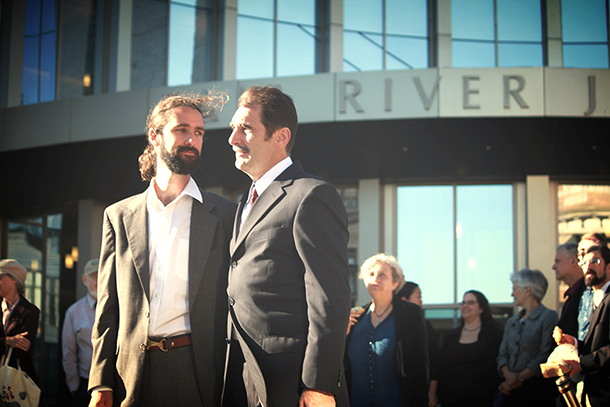
Climate activists Jay O’Hara and Ken Ward outside the courthouse in Fall River, MA (Photo: Kate Toomey; CC BY 2.0)
In a surprise move, Massachusetts DA Samuel Sutter dropped criminal charges against climate activists who used a lobster boat to block a freighter carrying 40,000 tons of coal from reaching the Brayton Point power plant. Blockader Jay O’Hara speaks with host Steve Curwood about the action, the legal argument for the protest and why the climate crisis makes civil disobedience necessary.
Transcript
CURWOOD: From the Jennifer and Ted Stanley Studios in Boston and PRI, this is Living on Earth. I’m Steve Curwood. Climate activists are celebrating an unlikely hero, Samuel Sutter, the District Attorney of Bristol County, Massachusetts. On September 8th, DA Sutter dropped all criminal charges against two men who, back in May, used a small lobster boat - aptly named the Henry David T - to block a shipment of coal headed to the Brayton Point power plant in Somerset. Instead, the prosecutor accepted the argument of the two activists, Jay O’Hara and Ken Ward, that the risks of global warming compelled their act of civil disobedience —something Jay O’Hara only learned the morning he and his colleague were scheduled to go on trial.
O’HARA: We had been hearing kind of rumors from the prosecutor since Friday, but they hadn’t come to any conclusion until Monday morning. We were waiting diligently in court at the appointed hour, and the prosecutor came in, and shortly thereafter the District Attorney came in. And it was clear from that moment that it wasn’t going to be a normal trial proceeding that morning.

The Energy Enterprise was carrying 40,000 tons of coal bound for the Brayton Point power plant in Massachusetts. (Photo: Lobster Boat Blockade)
CURWOOD: No, indeed. And on the courthouse steps DA Samuel Sutter explained the legal thinking to the crowds.
SUTTER: The decision that Robert Kidd and I, that’s the Assistant District Attorney who handled this case, reached today was a decision that certainly took into consideration the cost to the taxpayers in Somerset, but was made with our concern for their children, the children of Bristol County and beyond in mind. Climate change is one of the gravest crises our planet has ever faced.
CURWOOD: Activist Jay O’Hara told us his story when he came by our studio.
O'HARA: You know, I’m a Quaker, and so I try to open myself to whatever comes, and I've been really detached from whatever the outcome is. I wasn't clear what was the right or the best outcome, and every step along the way of this, right from the beginning, planning the action through doing the action, we kept finding that new, unexpected things ended up turning out in interesting and better ways than we ever could have planned. And so this seemed like just another one of them. The roll continues.
CURWOOD: What did you have to pay in terms of fines here?
O'HARA: Well, we actually didn't technically have to pay fines. The finding was, we were found responsible and asked to pay $2,000 restitution to the Somerset police and the state police for their overtime charges essentially.
CURWOOD: So this was not a penalty, this was not criminal then; this was civil?
O'HARA: Correct. Right.
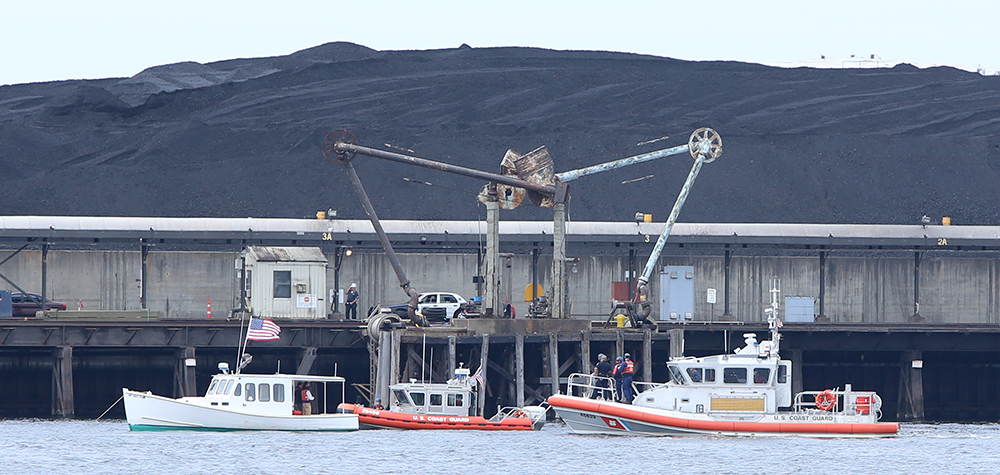
The Henry David T surrounded by Coast Guard boats with the coal ship in the background (Photo: Lobster Boat Blockade)
CURWOOD: You were inconvenient for those police.
O'HARA: Fortunately I think we were more inconvenient for the Energy Enterprise, the ship that was trying to dock, which was our intention. We really had no interest in being inconvenient for the police, but they showed up, and I think we owed them some of the money to deal with that.
CURWOOD: So take us back to the action itself. How did this all come about? How did you and your partner, not in crime, but in civil disobedience, Ken Ward, decide to this?
O'HARA: I had been working for a while here in the climate movement in Massachusetts, and the response we were getting, from either legislation that was introduced or policies that were proposed, it was clear that those policies were never going to reach the demands of the science. And we were never going to get the sort of dramatic emissions reduction that the science demands.
After a period of searching for what the right thing to do was, I felt really kind of clear that it was time to do something that showed viscerally how the problem is connected to the burning of coal and to put myself in the middle of that process: the shipment to the burning. And Ken, for his own reasons, had been thinking along similar lines, and we kind of came to this independently. And there was one night in the fall of 2012 when Scott Brown and Elizabeth Warren were running for the Senate here in Massachusetts, and they had had two debates, and hadn't mentioned climate at all. And we were vigiling 24 hours a day at the Government Center here in Boston to get them to talk about climate. Ken showed up at three in the morning with some hot cider on a rainy day on the eve of Hurricane Sandy bearing down on New England and New York, and said, "Jay, I have an idea. Why don't we get a boat and block the ship at Brayton Point?" And my heart just kind of just leapt for joy. It was clear that this was the work for me to do.
CURWOOD: You have this lobster boat called the Henry David T...I mean, was that the name of the boat before you embarked on this?
O'HARA: We did rename the boat. We'll confess to that. Yes.
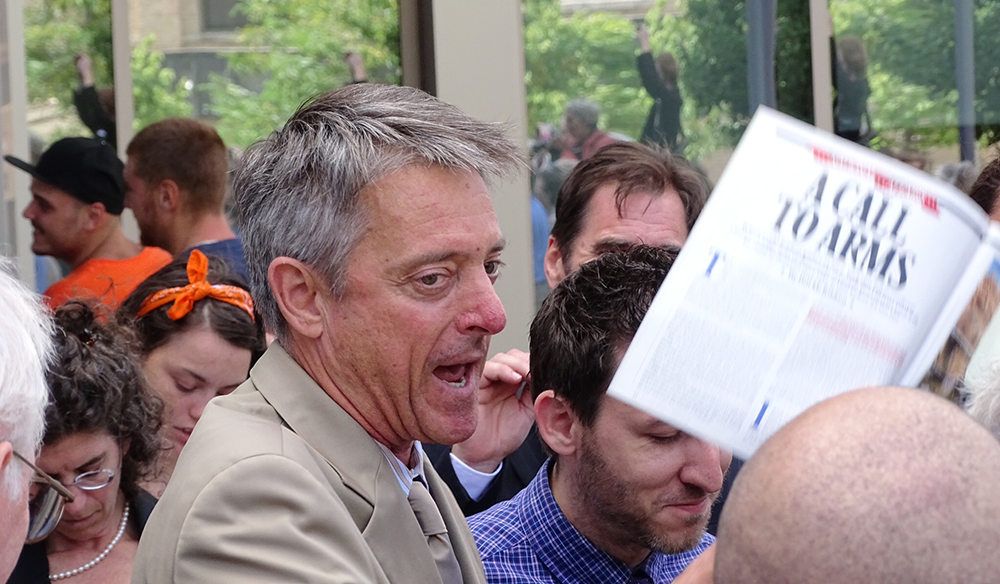
During his press conference, District Attorney Samuel Sutter holds up a copy of an article by writer Bill McKibben. (Photo: Peter Bowden)
CURWOOD: OK. So tell me, what happened on that day?
O'HARA: We had spent the night in Newport, Rhode Island. We woke up really early, and at 6 a.m. just before sunrise, we were on the dock for a short prayer meeting. We got on the Henry David T and motored north through Narragansett Bay under a cloudless sky on a windless day. It was absolutely beautiful. And we had been tracking and were able to track, actually, online, the position of the ship, the Energy Enterprise, which was delivering these 40,000 tons of Appalachian mountaintop removal coal, and we could tell that it was going to be heading up the bay behind us. We motored up the bay and navigated our way into the Brayton Point ship channel. We dropped two anchors, one a pretty small standard anchor and one very large heavy one that was chained to the keel of our boat, making us essentially an immovable block between the incoming ship and the pier where it intended to unload its coal. But before the ship ended up bearing down on us, the coast guard arrived. They boarded our boat, and while they were on board the boat, the tugboats and the others who were assisting the ship to come actually came in and half-moored the boat; they kind of put it on the pier, but in a place where they couldn't unload their coal. They weren't in any danger. They were kind of safely tied up, but the bow of this enormous ship was towering over us only maybe 200 feet away. And it was a pretty impressive hulk looking up over it.
CURWOOD: Now, what did the Coast Guard or anybody know about this civil obedience before you did it? Did you give them a heads-up: we're going to be out there.
O'HARA: We did. Through this whole process, our intention is to be absolutely transparent. Once we dropped anchor the first thing we did was call the town of Somerset police department and let them know that we were conducting a nonviolent peaceful protest and that our intentions were to remain in the ship channel. We had a couple of conversations with them. I spoke with the captain of the coal ship on the VHF radio, on the marine radio, so everyone was very clear about our intentions.
CURWOOD: What did you tell the captain? You said, "Ahoy here, this is the Henry David T and then...?"
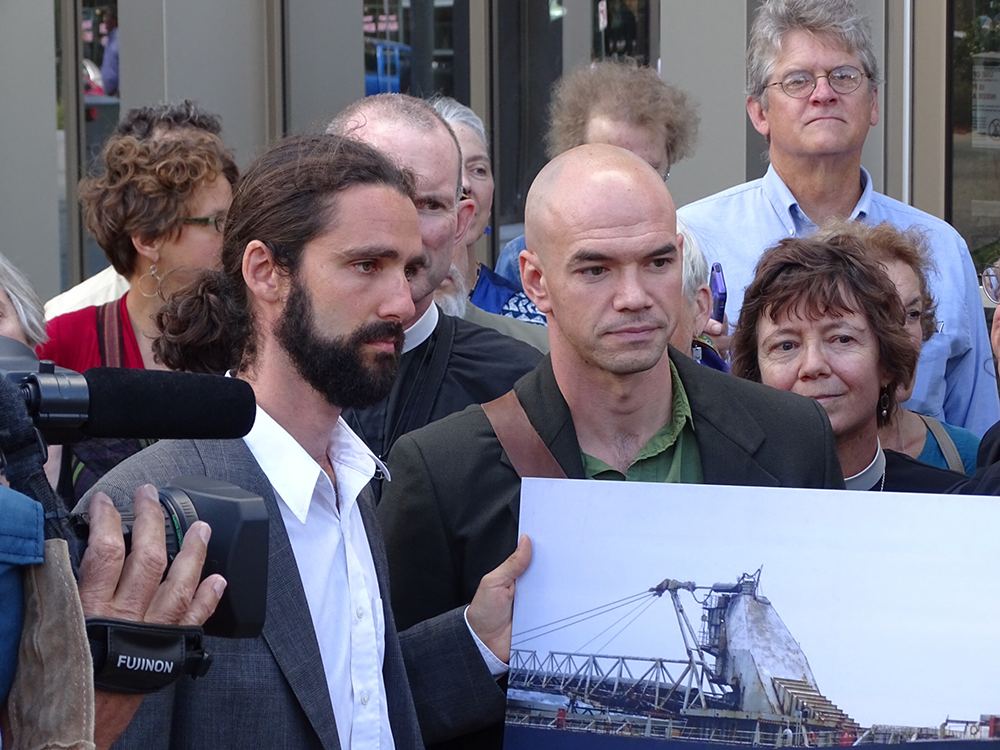
Jay O’Hara (L) with activist Tim DeChristopher, who was jailed for 21 months for protesting oil and gas leasing on 22,000 acres of federal land. (Photo: Peter Bowden)
O'HARA: Well, the most amazing part of that conversation was that the captain couldn't quite understand what we were talking about, that we were, with some incredulity he asked, "but this is American coal", as if the protest was about the nationality of the coal or our energy sources, when in fact I was able to reply, "it's actually about the coal itself and the climate crisis that it's bringing on us." And I wouldn't even call this civil disobedience; what we really did was direct action. We put ourselves in a place where our bodies were physically preventing the harm that is happening, and the harm is the burning of fossil fuels.
CURWOOD: So what happened in the end? To what extent do you feel you able to stop this shipment?
O'HARA: We were ordered to leave by the Coast Guard and threatened with enormous penalties had we not left. And we ended up, after hours of trying to literally raise the anchor by ourselves, which proved impossible, hiring a salvage company under Coast Guard order to remove the 200-pound anchor, and we left on our own power, knowing that there would be charges to follow.
CURWOOD: So nobody arrested you.
O'HARA: We were never arrested, never detained.
CURWOOD: But you were charged, and they were pretty serious charges I gather. What exactly were they?
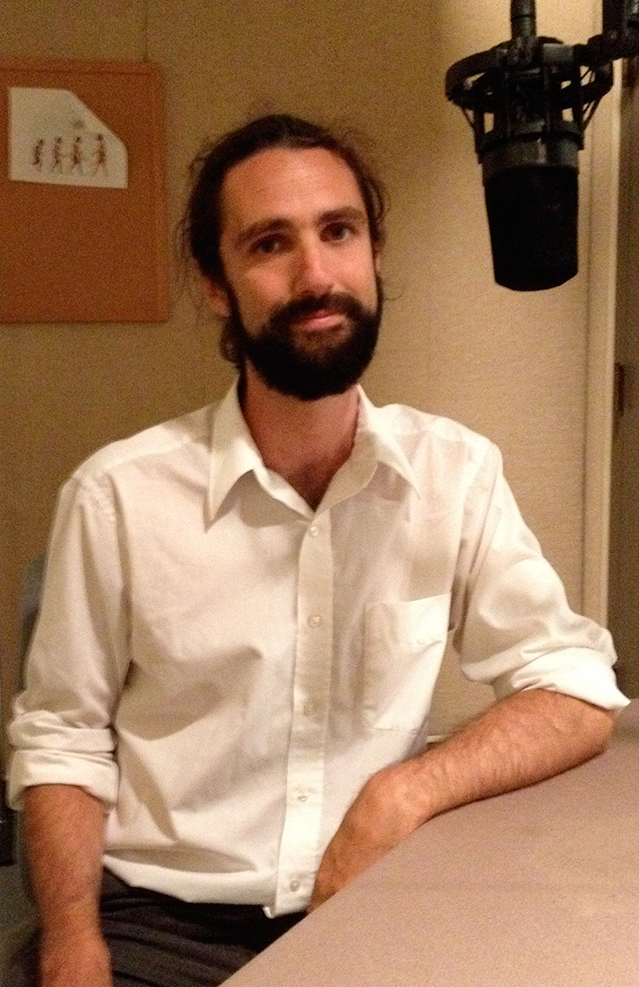
Jay O’Hara in the Living on Earth studio (Photo: Steve Curwood)
O'HARA: We had a charge of felony conspiracy to commit a crime. We had a charge of disturbing the peace. We had a charge of negligent operation of a motor vessel and failure to act to avoid a collision, much of which we were prepared to fight in court, but more importantly, in court, what we were looking to do was to give what is classically known in the common law as a necessity defense, saying that our actions—while they may have broken some laws, given the threat to public safety and public well-being—are necessary to prevent that greater harm.
CURWOOD: It's like saying, “well, I went the wrong way on the one-way street to help put out the fire”.
O'HARA: Yeah, or “I jaywalked to make sure the person wasn't hit by the car”.
CURWOOD: How prepared were you to go to jail?
O'HARA: I felt very clear that if I was sentenced by a...or if I was convicted by a jury of my peers that I was ready and prepared to face the consequences of my action, knowing that that sort of commitment is the sort of commitment that changes hearts when people see other people put their lives on the line for something that really matters—put their lives on the line for the truth, people's hearts changed. And I think that's exactly what happened with the district attorney. He saw two guys who put, maybe not their money but at least their bodies, where their mouth was and that inspired him to come out and say, hey, this is a huge problem, and more of us need to get on board with it.
CURWOOD: So all in all, what's the significance of this ruling and your action in terms of the broader climate movement, do you think?
O'HARA: I think that remains to be seen. While we were only able to stop the shipment for 12 hours, I think that was a pretty big victory. The thing about direct action, which helps stop these problems, is that it inspires people because they see the moral clarity of the act and the moral depravity of the way business as usual is conducted. And just a couple of months later in July, there were over 300 people rallying at the gates of the plant with dozens risking arrest to show their commitment to shutting down the burning of coal in Massachusetts, as well as there was a subsequent march in August and then eventually later that fall, the plant's owners announced its intended closure by 2017.
CURWOOD: September 21st in New York City, a lot of climate activists are coming together to have what they hope/pray will be the biggest climate demonstration ever in this country. What's next for you: plans to join that rally? I gather the District Attorney Samuel Sutter is going to be there as well.
O'HARA: That's exactly what he said yesterday, that he plans to be there in New York. I plan to be there, and I know hundreds and hundreds of other people from all over are planning to be there. Thousands and maybe even a million people will be there. My partner and I are going to be sailing our sailboat from Fall River where the trial was, down Long Island Sound and meeting with and talking with interfaith groups concerned with climate change on the way to New York, getting ready for that big rally. But for me, showing up to the rally is important, but it's not in any way the endgame. The endgame is when we start to turn our whole lives over to living in according with this truth. And I know, I trust that there are hundreds, maybe thousands of people across the country, who are ready to put that commitment into action and I'm looking forward to seeing what comes.
CURWOOD: Jay O'Hara and his colleague Ken Ward successfully used a necessity defense to argue that climate change compelled their act of civil disobedience, blocking a coal ship from landing at Brayton Point, Massachusetts. Thanks so much for coming by the studio today, Jay.
O'HARA: Thanks so much Steve. It was a pleasure.
Links
Living on Earth wants to hear from you!
Living on Earth
62 Calef Highway, Suite 212
Lee, NH 03861
Telephone: 617-287-4121
E-mail: comments@loe.org
Newsletter [Click here]
Donate to Living on Earth!
Living on Earth is an independent media program and relies entirely on contributions from listeners and institutions supporting public service. Please donate now to preserve an independent environmental voice.
NewsletterLiving on Earth offers a weekly delivery of the show's rundown to your mailbox. Sign up for our newsletter today!
 Sailors For The Sea: Be the change you want to sea.
Sailors For The Sea: Be the change you want to sea.
 The Grantham Foundation for the Protection of the Environment: Committed to protecting and improving the health of the global environment.
The Grantham Foundation for the Protection of the Environment: Committed to protecting and improving the health of the global environment.
 Contribute to Living on Earth and receive, as our gift to you, an archival print of one of Mark Seth Lender's extraordinary wildlife photographs. Follow the link to see Mark's current collection of photographs.
Contribute to Living on Earth and receive, as our gift to you, an archival print of one of Mark Seth Lender's extraordinary wildlife photographs. Follow the link to see Mark's current collection of photographs.
 Buy a signed copy of Mark Seth Lender's book Smeagull the Seagull & support Living on Earth
Buy a signed copy of Mark Seth Lender's book Smeagull the Seagull & support Living on Earth

